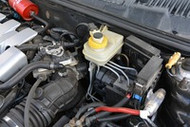Do I Really Need to Change My Car's Brake Fluid?
2nd Sep 2016

You don't have to be a professional auto mechanic to know the importance of brake systems. Typically featuring brake discs, calipers and pads, this system is responsible for slowing down and stopping your car when you press the brake pedal. There's another component of modern-day automotive brake systems that often goes unnoticed, however: the brake fluid. So, is it really necessary to change your brake fluid?
This is a question that remains open for debate. Some automakers recommend changing (or flushing) brake fluid every X amount of miles, while others completely omit this process from their recommended maintenance. Volkswagen, for instance, recommends flushing and replacing brake fluid once every two years, while Chevrolet recommends doing it once every 10 years or 150,000 miles, whichever comes first.
Because different automakers have different recommendations regarding brake fluid, you should refer to your owner's manual for more information. This should reveal when and how to replace the brake fluid, assuming it's necessary. If you can't find this information listed in your owner's manual, contact your local dealership for assistance.
Generally speaking, though, brake fluid can last a LONG time without needed a flush. In some cases, the brake fluid may never require changing. This is in stark contrast to other liquids, such as engine oil which must be changed on a regular basis to prevent contaminants from accumulating inside the engine.
There are exceptions to this rule, however, such as the intrusion of moisture. If water -- even small amounts -- enters the brake fluid, it can promote rust and corrosion. Of course, rust is something you never want to see in your brake systems, as it can literally eat away at the components. Another instance in which brake fluid should be replaced is when the car has experiences at least one overheating episode. If the temperature rises beyond normal operating levels, it can burn the fluid, changing its properties and reducing its effectiveness.
Brake fluid is relatively cheap, so don't assume that changing yours is going to cost an arm a leg. If it's recommended by your automaker, check to see what type of brake fluid it uses. Some cars use DOT 3, while others use DOT 5. It's important to use the right type of brake fluid, as it has the correct properties to work in your car's respective braking system. You can often find the brake fluid type used in your car by checking the owner's manual, or by looking on the brake fluid reservoir.



